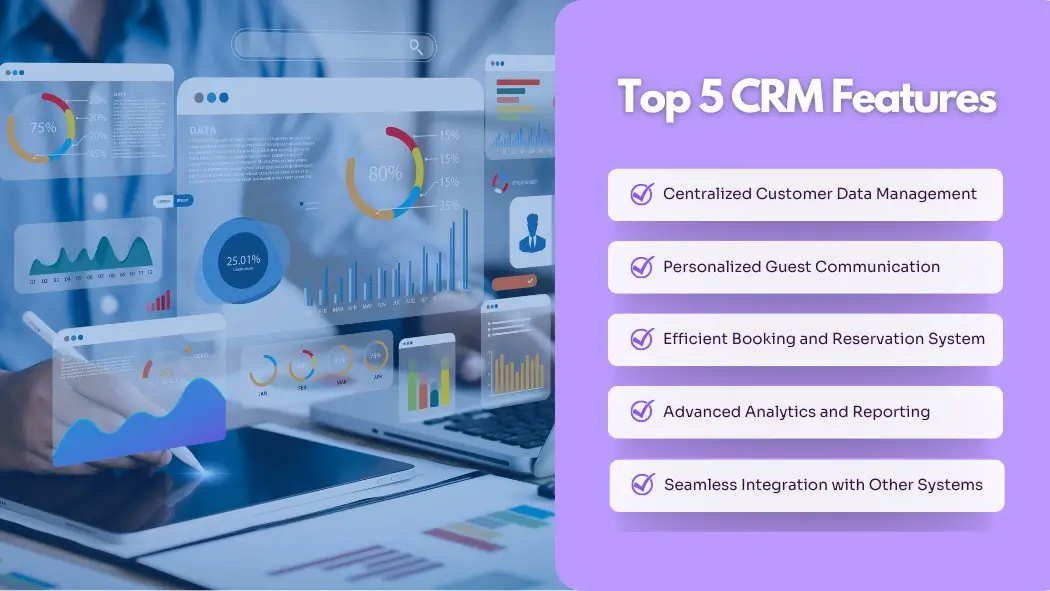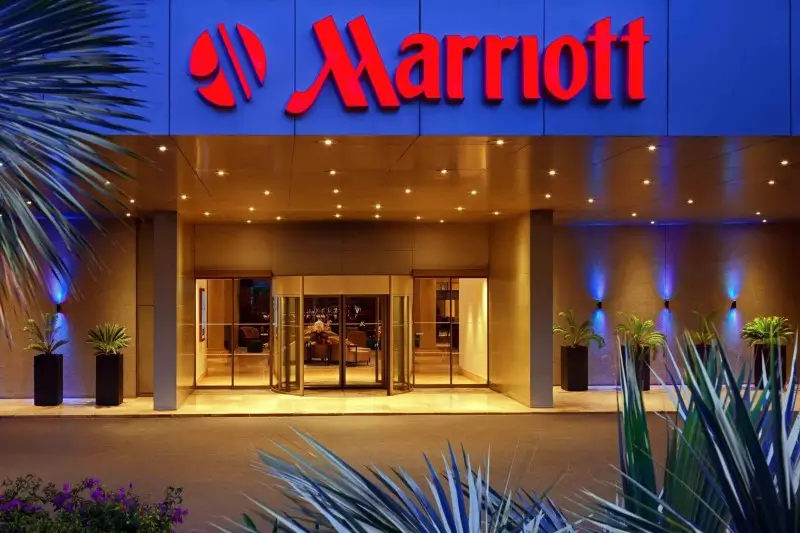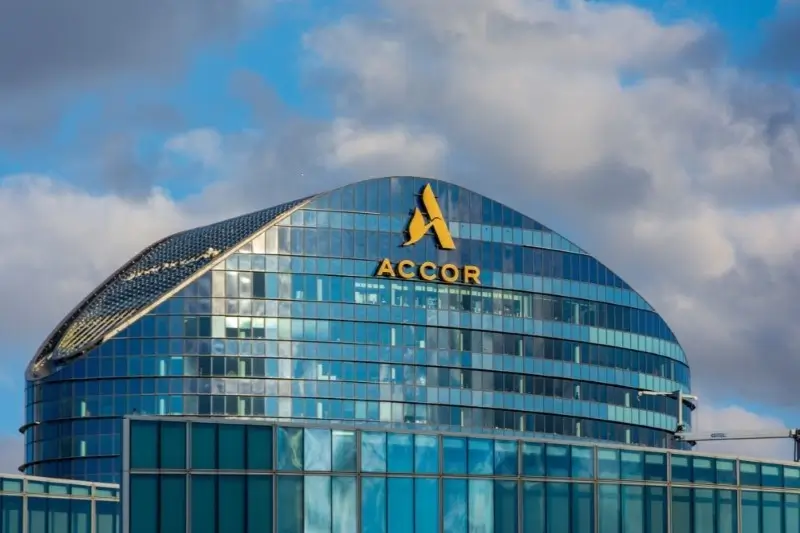In today's fast-paced and competitive business environment, it has become essential for hotelier to have a comprehensive understanding of Customer Relationship Management (CRM) system and its importance in the hospitality industry. A CRM is a powerful tool that can help hotels streamline operations, improve guest satisfaction, and drive revenue. In this article, we will explore five key CRM features that every hotelier should know and understand.
Introduction to CRM and Its Importance in Hospitality
A CRM or Customer Relationship Management system, is designed to help hotels manage guest journeys and streamline processes across all teams from sales, marketing, events, reservations, and finance in one centralized system.
By implementing a robust CRM system, hotel managers can consolidate customer data from various sources, such as booking engines, property management systems (PMS), and other systems. This centralized data management enables hotel staff to have a holistic view of each guest, resulting in personalized and tailored interactions.
CRMs in the hospitality sector go beyond just managing guest interactions; it also involves forecasting and analyzing customer behavior to anticipate their needs and preferences. By utilizing data analytics and segmentation techniques, hotels can create targeted marketing campaigns and offers that resonate with different customer segments.
Additionally, CRM systems allow hotels to track the effectiveness of their marketing initiatives and customer engagement strategies. By monitoring key performance indicators (KPIs) such as customer retention rates, satisfaction scores, and repeat bookings, hoteliers can continuously improve their services and offerings to meet evolving guest expectations.

Feature #1: Centralized Customer Data Management
One of the key features of CRM in the hotel industry is centralized customer data management. This feature allows hotel managers to gather and organize guest information in a single, comprehensive database. With all guest data easily accessible, hotel staff can quickly retrieve and analyze valuable information such as guest preferences, previous stays, and special requests.
This centralized data management not only enables hotel managers to understand their guests better but also facilitates personalized communication and targeted marketing campaigns. By leveraging the power of CRM, hotels can send personalized emails, offer customized promotions, and tailor their services to individual guests, thereby creating memorable experiences.
Furthermore, centralized customer data management plays a crucial role in enhancing operational efficiency within hotels. By having all guest information consolidated in one place, hotel staff can better coordinate between departments, anticipate guest needs, and provide seamless services. This efficiency not only improves the overall guest experience but also boosts staff productivity and reduces the likelihood of errors.
In addition to personalized communication, centralized data management enables hotels to enhance operations across all departments. By analyzing guest behavior, preferences, and booking patterns stored in the CRM system, hotels can identify trends and evaluate the effectiveness of various strategies. This comprehensive data analysis allows hotels to make informed decisions that improve front desk operations, housekeeping, event management, and revenue management. This data-driven approach empowers hotels to allocate resources effectively, optimize overall performance, and maximize their return on investment.
Feature #2: Personalized Guest Communication
Effective communication is the foundation of excellent guest service. With CRM, hotel managers can create personalized guest profiles that include preferences, interests, and contact details. Based on this information, hotel staff can communicate more effectively with guests, delivering tailored messages and recommendations.
For example, if a guest has a preference for a specific type of room or enjoys a particular activity, hotel staff can use their CRM to ensure that these preferences are noted and communicated across departments. This seamless communication not only enhances guest satisfaction but also increases the likelihood of repeat bookings and positive reviews.
Furthermore, personalized guest communication through a CRM can also extend to pre-arrival and post-stay interactions. By leveraging data stored in the system, hotels can send personalized welcome messages before guests arrive, setting the stage for a memorable stay. This proactive approach not only delights guests but also allows for any special requests or arrangements to be made in advance, streamlining the check-in process.
During the guest's stay, CRM enables staff to stay connected and address any needs or concerns promptly. Whether it's arranging a spa appointment based on a guest's past preferences or recommending local attractions based on their interests, personalized communication fosters a sense of care and attention to detail that sets the hotel apart.
Feature #3: Efficient Booking and Reservation System
Another crucial CRM feature for hotel managers is an efficient booking and reservation system. By integrating a CRM system with the hotel's booking engine or website, managers can automate and streamline the booking process.
With CRM, guests can easily make online reservations, access real-time availability, and receive confirmation emails. Additionally, hotel staff can track and manage reservations efficiently, ensuring that all guest preferences and requirements are met.
An advanced CRM system can offer personalized booking experiences for guests. Through data analytics and customer segmentation, hotels can tailor their promotional offers and room recommendations based on individual preferences and past booking history. This level of personalization not only enhances the guest experience but also increases customer loyalty and satisfaction.
Furthermore, the integration of a CRM system with a channel manager can optimize the distribution of room inventory across various online booking platforms. This automation ensures that room availability is updated in real-time across all channels, reducing the risk of overbooking and maximizing revenue potential. By centralizing booking management through CRM, hotel managers can make informed decisions based on comprehensive data analysis and forecasting tools.
Feature #4: Advanced Analytics and Reporting
Analytics and reporting are essential tools for hotels to make informed business decisions. CRM systems provide powerful analytics capabilities, allowing managers to gain valuable insights into guest behavior, preferences, and booking patterns.
By analyzing these data points, hotel managers can identify trends, optimize pricing strategies, and improve operational efficiency. For instance, if the data shows a high demand for certain amenities or services, managers can adjust their offerings accordingly, ensuring guest satisfaction and driving revenue.
Moreover, advanced analytics can also help hotel managers forecast demand more accurately, allowing them to allocate resources efficiently and minimize waste.
By leveraging predictive analytics, managers can:
- Anticipate peak booking periods,
- Adjust staffing levels accordingly,
- Streamline inventory management processes.
This proactive approach not only enhances the overall guest experience by ensuring prompt service and availability of desired amenities but also contributes to cost savings and improved profitability for the hotel.
Feature #5: Seamless Integration with PMS, POS, and Other Systems
Hotels maintain multiple systems to manage various operational aspects, such as property management systems (PMS), point-of-sale (POS) systems, and customer loyalty programs. With CRM, these systems can be seamlessly integrated, allowing for efficient and synchronized data flow.
For example, when a guest makes a purchase at a hotel's restaurant, the POS system can automatically update the guest's CRM profile with the details of the transaction. This integration ensures that hotel staff has accurate and up-to-date information about each guest, allowing for personalized and efficient service.
The integration of these systems can also benefit the hotel in terms of revenue management. By analyzing data from PMS, POS, and CRM systems collectively, hotel managers can gain valuable insights into guest behavior, preferences, and spending patterns. This data-driven approach enables hotels to optimize pricing strategies, tailor marketing campaigns, and enhance overall guest satisfaction.
Furthermore, the seamless integration of PMS, POS, and other systems with a CRM can streamline operational processes within the hotel. For instance, when a guest checks in at the front desk, the PMS system can automatically trigger a welcome message personalized with the guest's name and preferences, based on the data stored in the CRM system. This level of automation not only enhances the guest experience but also improves operational efficiency for hotel staff.
Real-World Applications: How Top Hotels Leverage CRM Features
In the dynamic realm of hospitality, the practical application of CRM systems by leading hotel chains like Marriott International and Accor showcases the transformative power of this technology.
These industry giants have harnessed CRM to not only meet but exceed guest expectations, thereby securing a competitive edge in the market. This section delves into how these two global powerhouses apply CRM features to streamline operations, enhance guest satisfaction, and drive substantial business growth.
Marriott International's CRM Strategy

Marriott International utilizes its CRM system to elevate the guest experience across its global network. A pivotal feature of Marriott's CRM strategy involves the integration of customer data from various touchpoints into a centralized database, mirroring the first CRM feature discussed: centralized customer data management.
This allows Marriott to maintain detailed guest profiles, which are essential for personalized communication and service. For example, by analyzing guest feedback and behavior stored within their CRM, Marriott can tailor interactions and services to meet specific preferences and expectations, thus enhancing guest loyalty.
Furthermore, Marriott leverages advanced analytics and reporting tools within their CRM to monitor and respond to guest needs proactively. These tools help Marriott to forecast demand and tailor their marketing efforts, aligning with the fourth feature of CRM. The insights gained enable Marriott to optimize resource allocation, adjust staffing, and refine service offerings to improve overall customer satisfaction and operational efficiency.
Accor's Innovative Use of CRM

Accor harnesses its CRM system to enhance personalized marketing efforts and streamline guest service across its diverse portfolio of brands. By segmenting guest data, Accor effectively targets specific customer groups with personalized email campaigns, directly correlating with the second CRM feature of personalized guest communication. This approach not only increases direct bookings but also boosts revenue by appealing directly to the needs and preferences of different guest segments.
Like Marriott, Accor benefits from the seamless integration of CRM with other operational systems such as PMS and POS, as outlined in the fifth CRM feature. This integration ensures that all guest interactions, whether at the front desk or during dining experiences, are recorded and accessible across all points of service. Accor uses this integrated data to provide a cohesive and customized guest experience that seamlessly connects all aspects of a guest's journey, from check-in to dining and beyond, thereby reinforcing guest loyalty and enhancing the overall service quality.
Conclusion
In today's competitive hospitality industry, CRM have become a powerful tool for hotel managers to enhance guest satisfaction, drive revenue, and create personalized experiences. By understanding and leveraging the key features of a CRM, hotel managers can streamline operations, improve communication, and make data-driven decisions. Embracing CRM is not an option anymore – it is a necessity for hotel managers who want to stay ahead of the curve.